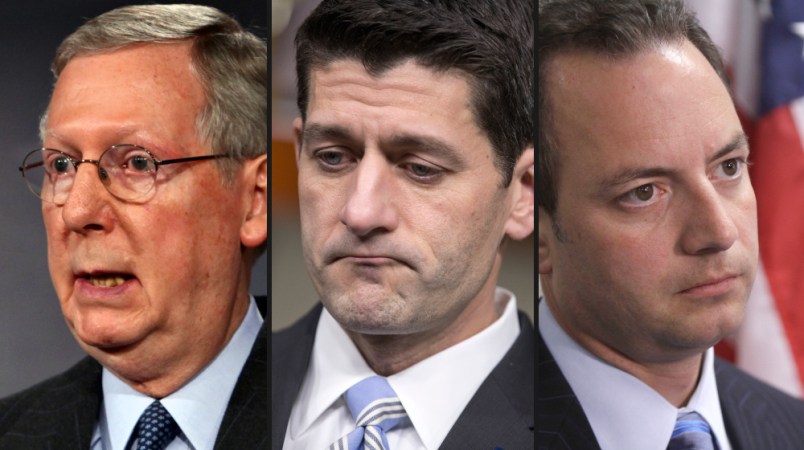Call it the August awakening. Republicans are realizing Trump’s “general election” pivot isn’t coming and the damage he is doing is worse than expected.
It’s been months since Trump defeated his primary opponents, weeks since the party’s convention, and yet nary does a day go by that he doesn’t engage in some sort of front-page controversy. You know the situation is dire when the Wall Street Journal editorial board is wondering whether it’s time for the GOP to dump its nominee. Vulnerable senators can’t step outside without Trump’s latest comment chasing them down the street.
But, for as tough it is for Republicans stuck in their support of Trump, the road to November doesn’t look much easier if they were to, in fact, officially disavow him. The political downsides to outright condemning the top of the ticket might be just as risky as staying with him, political scientist and historians tell TPM. Admitting publicly that the erratic real estate mogul might not be fit to serve as president would not only cost Republicans in base turnout in November. It tempts challenges from their right further down the road and puts in jeopardy their ability to pull the party back together once the 2016 nightmare is over.
“This is a party that historically has put a big premium on loyalty, and to be seen to side with the enemy, particularly in these polarized times, doesn’t do your career very much good,” said Geoff Kabaservice, author of “Rule and Ruin: The Downfall of Moderation and the Destruction of the Republican Party, From Eisenhower to the Tea Party.”
The current reality is a “damned if you do, damned if you don’t” dilemma for Republican electeds and party officials, with Trump’s base of support holding the whole party hostage.
“The bottom line is, whatever they do, they risk alienating a major bloc of votes they’re going to need to prevail in the general election. So if you disavow Trump, all those people who turn out at his rallies and stick with him despite his sort of daily stumbles will be potentially alienated,” said Cal Jillson, a professor of political science at Southern Methodist University. “It’s not just the polls, it’s the volunteers, it’s the Republican primary electorate that is largely still with Trump.
Republican leaders like House Speaker Paul Ryan, Senate Majority Leader Mitch McConnell and Republican National Committee Chair Reince Priebus have made the calculation that, at least for now, the party is better off largely lined up behind Trump. And even most of the lawmakers facing tough reelection fights have not completely severed themselves from their nominee. The calculus is that whatever votes they would gain in the independents and moderate Republican turned off by Trump would not make up for what they would lose in base turnout — which, in this hyper-partisan age, is key to winning elections.
“You walk a tightrope. You lose Trump supporters down ballot, and you can’t enlarge your base by moving away from it,” said G. Terry Madonna, the director of the Franklin and Marshall College Center for Politics and Public Affairs.
Furthermore, the kind of ticket-splitting Republicans would be asking voters to do — vote for me, even if I am telling you not to vote for my party’s nominee — is far less common that it was decades ago. It’s further complicated for those Republicans — like Sen. John McCain (R-AZ) — who have primaries challenges from their right still to weather.
The ramifications of spurning Trump supporters extend beyond Nov. 8. Even those who are safe for the time being or not up for re-election this year could see their disavowal of Trump haunt them down the road.
“Trump supporters are very vocal in their support and would be very vocal in their opposition to anyone who came out against Trump, and that would fuel a primary challenge in two years,” said John Pitney, a politics professor at Claremont McKenna College who has also served as research director at the Republican National Committee
The fact of the matter is that the 30 to 40 percent of Republicans who supported Trump in the primaries are not just going to go away if he loses, and they will need to be co-opted back into the party for it to survive.
“Part of the reason that I think people aren’t dissociating themselves from Trump, whatever they think of him, is that they want to be at the table in the discussion about how to put the Republican Party back together again,” Kabaservice said. “And they don’t want to disqualify themselves by having been seen to have sabotaged Trump in any way.”
There might be some recalibration towards abandoning Trump behind the scenes, as many are urging and as some RNC officials themselves have privately signaled, according to reports in Politico and Time. In 1996, when Bob Dole’s race against President Bill Clinton looked like a lost cause, GOP operatives began casting the choice down the ballot as a check against Bill Clinton’s second term. But the ship has likely sailed for any public rebuke of Trump — at least as where the party’s top officials are concerned.
“Speaker Ryan, Leader McConnell, other leading Republicans, the time has passed for them to look good in this situation,” said John Hudak, a fellow in governance studied at the Brookings Institutions. “It no longer looks like something of principle when you have stood by your endorsement in the face of what are comments that are beyond the pale.”







so this sorta boils down to party over Country and now the Repubs can show the lack of spine that Dems were formerly accused of…
You broke it, you buy it.
They get no sympathy from me.
You built this, boys. You own it. Great job. Maybe “thoughts and prayers” will help you. Good luck.
Fellas, I feel for ya. No, really…I do. Really! (How do you render suppressed giggling in print?)
~snicker~ always works for me.